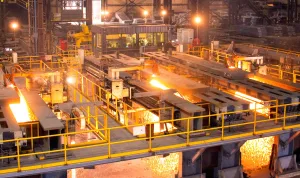How the Steel Market in Hong Kong Drives Growth and Innovation in Local Manufacturing Industries

Hong Kong’s manufacturing sector plays a vital role in the city’s economy, and at the heart of this industrial ecosystem is the steel market. Steel is a foundational material used across a variety of manufacturing industries, from construction to consumer goods. This article will explore how the steel market in Hong Kong supports local manufacturing industries, driving innovation, growth, and economic development.
The Importance of Steel in Manufacturing
Steel is one of the most versatile materials in modern industry, known for its strength, durability, and adaptability. Whether used in heavy machinery, construction materials, or consumer products, steel forms the backbone of Hong Kong’s industrial landscape. As a critical input for manufacturing, the steel market has a direct influence on the growth and competitiveness of local industries.
The availability of high-quality steel products at competitive prices ensures that manufacturers in Hong Kong can produce goods efficiently and cost-effectively, allowing them to compete on a global scale.
How the Steel Market Supports Local Manufacturing
1. Reliable Supply Chains for Manufacturing Needs
A strong and well-organized steel supply chain is essential for the smooth operation of local manufacturing industries. In Hong Kong, the steel market provides manufacturers with a consistent supply of raw materials, semi-finished, and finished steel products that are essential for various applications.
Local suppliers, traders, and distributors ensure that manufacturing industries have access to steel products tailored to their specific needs, whether it’s for high-precision machinery, construction, or everyday consumer goods. The reliability of Hong Kong’s steel market minimizes delays in production and enables manufacturers to plan their operations efficiently.
2. Cost-Effective Production Solutions
Steel accounts for a significant portion of the material costs in many manufacturing processes. As such, the pricing of steel directly impacts the overall costs of production. In Hong Kong, the steel market provides a range of competitively priced steel products that help manufacturers maintain cost-effective production.
Furthermore, the strategic location of Hong Kong as a global trading hub allows local manufacturers to benefit from competitive pricing through import agreements and regional trade partnerships. This helps Hong Kong’s manufacturing industries maintain a competitive edge in both domestic and international markets.
3. Access to High-Quality Steel Products
The steel market in Hong Kong offers access to a wide variety of steel grades and products, meeting the diverse needs of local manufacturers. These high-quality steel products are essential for producing durable, long-lasting goods that meet international standards.
For industries like construction, electronics, and automotive manufacturing, the availability of top-grade steel ensures that they can create products that are safe, reliable, and in demand globally. The adaptability and quality of steel provided by Hong Kong’s market contribute to the strength of local industries, enhancing their reputation and competitive position worldwide.
4. Fostering Innovation in Manufacturing
Innovation is a key driver of growth in the manufacturing sector, and the steel market plays a crucial role in enabling this innovation. By offering advanced steel products, such as high-strength alloys, corrosion-resistant steel, and lightweight materials, the market supports the development of cutting-edge products in various industries.
Hong Kong’s steel market enables manufacturers to experiment with new designs, improve the durability and performance of their products, and meet the evolving needs of consumers. This innovative environment allows industries such as electronics, aerospace, and construction to push the boundaries of what’s possible, contributing to the long-term success of local manufacturing.
5. Supporting Infrastructure and Construction Manufacturing
One of the largest users of steel in Hong Kong is the construction sector, which relies heavily on steel for building infrastructure, residential, and commercial projects. The steel market ensures that construction-related manufacturing industries have the necessary raw materials to produce steel-based components, including beams, columns, and reinforcements.
In turn, this supports Hong Kong’s wider development goals by facilitating the growth of urban infrastructure, transportation networks, and sustainable buildings. The manufacturing of construction materials also drives employment and economic growth, providing opportunities for both small businesses and large corporations alike.
Key Trends in Hong Kong’s Steel Market Supporting Manufacturing
1. Sustainability and Eco-Friendly Practices
As global demand for sustainable manufacturing grows, Hong Kong’s steel market is adapting by promoting eco-friendly practices and steel products with lower environmental footprints. Recycled steel and energy-efficient production methods are becoming increasingly popular, helping local manufacturers meet sustainability goals while reducing costs.
This focus on green manufacturing allows industries in Hong Kong to attract environmentally conscious clients and consumers, enhancing their market appeal and ensuring compliance with international environmental standards.
2. Integration with Regional and Global Markets
Hong Kong’s steel market is well-connected to global and regional supply chains, benefiting from its position as a trade hub. This integration allows local manufacturers to access steel products from major producers in countries like China, Japan, and South Korea, as well as distribute their products efficiently across Asia and beyond.
By being part of a larger network, Hong Kong’s manufacturing industries can maintain flexibility, mitigate risks related to supply chain disruptions, and expand their market reach.
3. Adoption of Advanced Manufacturing Technologies
The ongoing adoption of Industry 4.0 technologies—such as automation, digitalization, and smart manufacturing—requires steel products that are adaptable to new manufacturing methods. Hong Kong’s steel market is increasingly catering to these technological advancements by supplying materials that can be integrated into high-tech manufacturing processes.
Local industries are leveraging these advanced materials to create more precise, energy-efficient, and high-performance products, keeping Hong Kong at the forefront of industrial innovation.
Conclusion
The steel market in Hong Kong is a critical pillar supporting local manufacturing industries. By providing a reliable supply of high-quality, cost-effective, and innovative steel products, the market ensures that Hong Kong’s manufacturers can thrive in a competitive global environment. As the city continues to pursue sustainable and technology-driven growth, the steel market will remain a key enabler of industrial progress, contributing to the broader economic development of Hong Kong.



